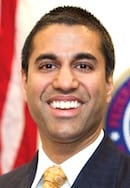Will FCC Shut Down Your Main Studio?




The document goes on to claim that, “Additionally, the record shows that eliminating the main studio rule will produce substantial benefits. Broadcasters will be able to redirect the significant costs associated with complying with the main studio rule to programming, equipment upgrades, newsgathering, and other services to the benefit of consumers. Repealing the rule will also encourage the launch of new broadcast stations in small towns and rural areas and help prevent existing stations in those areas from going dark. This Report and Order removes requirements that are now outdated and unnecessarily burdensome for broadcast stations.”







